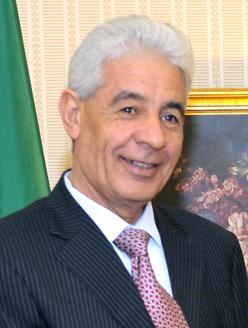Libya’s foreign minister defects to Britain
Libyan Foreign Minister Moussa Koussa
By Laura Lynch
Moammar Gadaffi appears to have lost one of his top officials. Former Foreign Minister Moussa Koussa flew to a military base in southern England Wednesday night. Koussa himself has yet to speak about his decision to leave Libya. But the British government is calling his departure a blow to Gadaffi.
Koussa arrived after dark aboard a British military plane, his sudden departure from power in Tripoli shrouded in mystery. Moussa Koussa is reportedly being debriefed.
British Prime Minister David Cameron was quick to claim Koussa’s apparent defection as a propaganda coup
“But I think it does show a huge amount of decay, distrust and breakdown at the heart of the Gadaffi regime,” said Cameron. “This was his foreign minister. This was a key member of his government. The fact he’s decided to leave and effectively defect and give up his role I think speaks volumes about what is happening in that regime.”
Koussa arrived in the same country that once expelled him for openly advocating the killing of Libyan dissidents on British soil. But in recent years Koussa appeared to shift strategies. Former British Foreign Secretary Jack Straw said Koussa played a key role in ending Libya’s international isolation.
“I’m in no doubt that he has occupied a key position at the heart of the intelligence and security apparatus of the Gaddafi regime and I am in absolutely no doubt that that he played a fundamentally important role in getting Gaddafi to agree to give up his nuclear weapons and his chemical weapons programme,” Straw said.
Downplaying the resignation
In Tripoli, Gadaffi’s Spokesman Ibrahim Moussa said Koussa had asked for sick leave and had left for Tunisia. Moussa said Koussa had not told anyone in the government of his plans to travel to Britain. Still, Moussa downplayed the former foreign minister’s resignation.
“The battle for Libya to be independent and free does not depend on one person or one individual, but on the hundreds of thousands and millions of Libyans leading the fight for Libyan freedom and independence,” said Moussa.
For some in Britain, Koussa’s sudden arrival raises new questions about old cases.
Scottish prosecutorsannounced they are seeking him for questioning in connection with the 1988 Pan Am plane bombing over the town of Lockerbie, Scotland. 270 people died when the plane exploded. Jim Swire, whose daughter Flora was one of the Lockerbie victims, said he hopes Koussa will provide essential information:
“From the point of view of the Lockerbie relatives his defection – if that’s what it is – to Britain is a day for rejoicing because all we’re after is very simple, is the truth about who killed our families and why they did it and how they did it and it may turn out that Libya didn’t have such a central role as everyone is presuming at the moment, but I think the two questions that he can certainly answer is: if Libya was involved, how did they carry it out and secondly — why?” said Swire.
Warm welcome
Hisham Matar, a Libyan writer living in exile in London, worries that Koussa is being given too a warm welcome by Britain’s Foreign and Commonwealth office — or FCO.
“Moussa Koussa has been called many things, the most colourful of which are the envoy of death, the father of Lockerbie,” Matar said. “I mean look very few of Gadaffi’s men are associated more strongly with macabre violence than the man who now enjoys the hospitality of the FCO.”
The government says Koussa isn’t being offered immunity. But Matar said if he is arrested, it might discourage other potential defectors who are considering abandoning Gadaffi.
“At the same time if he is given asylum here, it would shake any Libyan’s faith in Britain’s commitment to justice,” Matar said. “And many Libyans now see Britain as a partner in the future of Libya and how Britain treats Musa Qusa will be very important in that regard.”
Despite his dramatic resignation, Koussa is unlikely to be embraced by Libya’s opposition movement who remember all too well his years at the center of power in Tripoli.
